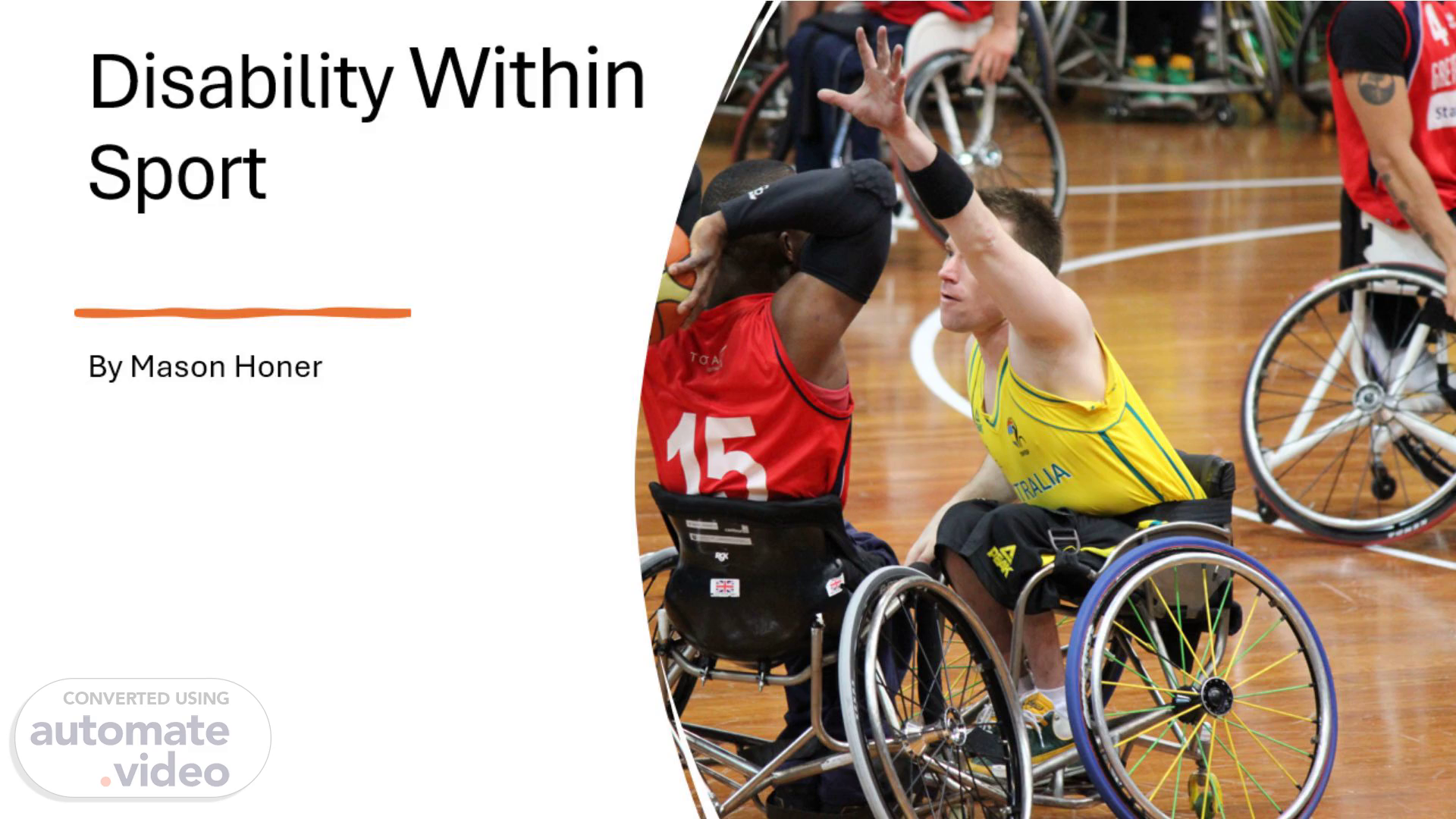
Disability Within Sport
Scene 1 (0s)
Disability Within Sport. By Mason Honer. [image] A group of people in wheelchairs playing basketball Description automatically generated.
Scene 2 (11s)
[Audio] I will be doing a presentation on disability within sport and how people with disabilities may struggle within the sporting industry. You may be asking what a disability is, and a disability is defined as having a physical or cognitive impairment, and the impairment has a substantial and long-term adverse effect on the person's ability to conduct normal day-to-day activities..
Scene 3 (36s)
[Audio] Sport has always been known for their positive physical aspects on the body, however in recent years, research on sport has also shown that sport has a positive effect on mental health and wellbeing as well as physical health. When participating in sports, it reduces your stress levels significantly as the stress hormones in your body are dropped and the physical activity simultaneously stimulates the production of endorphins. These natural mood lifters are what helps you keep your stress and depression levels low and at bay so your mood may also retain high. The reason in which people with disabilities should participate in sporting activities is because sport allows us to acquire vital social skills, develop independence and become empowered. Due to the social and friendly environment that would be present this allows individuals to communicate effectively as well as highlighting the significance of collaborating with one another and emphasising respect for one another along with positively co-operating with others..
Scene 4 (1m 44s)
Disability Within Sport – Positive Aspects of Sport.
Scene 5 (2m 10s)
[Audio] However, it is shown that people who unfortunately suffer from impairments are more likely to be inactive with 43% not participating in sport, whereas those who do not suffer with any impairments are twice as likely to be active with 79% participating in sport. It has also been shown that as the number of impairments increase so does the likelihood that they will not participate within any sporting activities. These shocking statistics have also been reinforced through National Statistics stating that 27.6% of people with disabilities had participated in a sporting group, compared to 43.1% of people with no disabilities or impairments..
Scene 6 (2m 53s)
[Audio] The reasons that people with disabilities may not participate in sport could be that they face barriers such as psychological issues, as due to their physical ability they may have a severe lack in confidence and be unsure of their abilities and capability which could have drastically unmotivated them to participate in a sporting activity. There could also be physical barriers preventing access and restricting possibilities of those with disabilities to participate in sport, such as facilities not having suitable access for those who have impairments, such as ramps and elevators for those in wheelchairs. The cost and fees of the session may also be a barrier as people with disabilities may not have a formal and sustainable income resulting in them not having any disposable income, they can spend on affording the fees of the session..
Scene 7 (3m 48s)
[Audio] Ways to solve these barriers and to allow and help those with disabilities to participate in sport would be to install ramps in facilities to allow those with limited mobility to enter the facilities, which is now a law due to the introduction of the Equality Act 2010 Disability Discrimination Act. The fees of the session could also be lowered to allow those who have disabilities have dot have disposable income to still attend the sessions and make the sessions using the most minimalistic movements possible, so that those with psychological worries of attending the session have nothing to worry about as the session isn't physically demanding in the slightest..
Scene 8 (4m 31s)
[Audio] To help improve the participation of those with disabilities around the world, over 50 Erasmus+ projects have been supported since 2014 with EU countries such as France, Ireland and Netherlands have adopted centralised approaches based on national strategies and funding initiatives in 2021. Countries such as Ireland has had a major funding from Sport Ireland as they recently allocated £249,000 to the Irish Wheelchair Association..
Scene 9 (5m 3s)
[Audio] In conclusion we should help those with disabilities to participate in sport as sport doesn't just have positive physical contributions, but positive mental contributions and mental health is just as important as physical health. These positive contributions help the human body significantly, therefore those who struggle to attend and participate in sport should be helped and supported and those who suffer with impairments and disabilities are who struggle to participate in sporting activities..